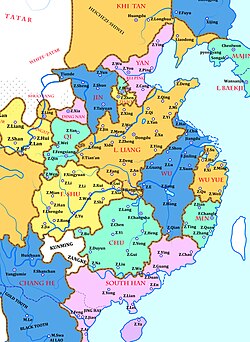

Chu
楚
| |||||||||
|---|---|---|---|---|---|---|---|---|---|
| 907–951 | |||||||||
 | |||||||||
| Capital | Changsha | ||||||||
| Common languages | Middle Chinese | ||||||||
| Government | Monarchy | ||||||||
| Prince/King | |||||||||
• 907–930 | Ma Yin | ||||||||
• 950–951 | Ma Xichong | ||||||||
| Historical era | Five Dynasties and Ten Kingdoms Period | ||||||||
• Became the State | 907 907 | ||||||||
• establishment of the Kingdom | 927 | ||||||||
• Ended by Southern Tang | 951 951 | ||||||||
| Currency | Silk, Coin (Iron) | ||||||||
| |||||||||
Chǔ (楚), often referred to as Ma Chu (马楚) or Southern Chu (南楚) to distinguish it from other historical states called Chu, was a kingdom in southern China during the Five Dynasties and Ten Kingdoms period (907–960). It existed from 907 to 951.
Ma Yin was named regional governor by the Tang court in 896 after fighting against a rebel named Yang Xingmi. He declared himself as the Prince of Chu with the fall of the Tang Dynasty in 907. Ma’s position as Prince of Chu was confirmed by the Later Tang in the north in 927 and was given the posthumous title of King Wumu of Chu.
The capital of the Chu Kingdom was Changsha (Tanzhou).[1] Present-day Hunan and northeastern Guangxi were under the control of the kingdom.
Chu was peaceful and prosperous under Ma Yin's rule, exporting horses, silk and tea. Silk and lead coinage were often used as currency, particularly with external communities which would not accept other coinage of the land. Taxation was low for the peasantry and merchants.
After Ma Yin died the leadership was subject to struggle and conflict which resulted in the fall of the kingdom. The Southern Tang, fresh from its conquest of the Min Kingdom, took advantage and conquered the kingdom in 951. The ruling family was removed to the Southern Tang capital of Jinling. However, the following year, Chu generals rose against Southern Tang and expelled the Southern Tang expeditionary force, leaving the former Chu territory to be ruled by several of those generals in succession until 963, when the territory was seized by Song Dynasty. During these post-Chu years of de facto independence, the center of power was usually at Lang Prefecture (朗州, in modern Changde, Hunan).
| Temple Names ( Miao Hao 廟號 miao4 hao4) | Posthumous Names ( Shi Hao 諡號 ) | Personal Names | Period of Reigns | Era Names (Nian Hao 年號) and their according range of years |
|---|---|---|---|---|
| Did not exist | Wǔmù Wáng 武穆王 | Mǎ Yīn|馬殷 | 907–930 | Did not exist |
| Did not exist | None (commonly known as Prince of Hengyang (衡陽王, Héngyáng Wáng)) | Mǎ Xīshēng|馬希聲 | 930–932 | Did not exist |
| Did not exist | Wénzhāo Wáng 文昭王 | Mǎ Xīfàn|馬希範 | 932–947 | Did not exist |
| Did not exist | None (commonly known as Deposed Prince (廢王, Fèi Wáng)) | Mǎ Xīguǎng|馬希廣 | 947–951 | Did not exist |
| Did not exist | Gōngxìao Wáng 恭孝王 | Mǎ Xī'è|馬希萼 | 951 | Did not exist |
| Did not exist | Did not exist | Mǎ Xīchóng|馬希崇 | 951 | Did not exist |
| Did not exist | Did not exist | Líu Yán|劉言 | 951–953 | Did not exist |
| Did not exist | Did not exist | Wáng Kúi|王逵 | 953–956 | Did not exist |
| Did not exist | Did not exist | Zhōu Xíngféng|周行逢 | 956–962 | Did not exist |
| Did not exist | Did not exist | Zhōu Bǎoquán|周保權 | 962–963 | Did not exist |
| Ma rulers family tree | |||||||||||||||||||||||||||||||||||||||||||||||||||||||||||||||||||||||||||||||||||||||||||||||||||||||||||||||||||||||||||||||||||||||||||||||||||||||||||||||||||||||||||||||||||||||||||||||||||||||||||||||||||||||||||||||||||||||||||||||||||||||||||||||||||||||||||||||||||||||||||||||||||||||||||||||||||||||||||||||||||||||||||||||||||||||||||||||||||||||||||||||
|---|---|---|---|---|---|---|---|---|---|---|---|---|---|---|---|---|---|---|---|---|---|---|---|---|---|---|---|---|---|---|---|---|---|---|---|---|---|---|---|---|---|---|---|---|---|---|---|---|---|---|---|---|---|---|---|---|---|---|---|---|---|---|---|---|---|---|---|---|---|---|---|---|---|---|---|---|---|---|---|---|---|---|---|---|---|---|---|---|---|---|---|---|---|---|---|---|---|---|---|---|---|---|---|---|---|---|---|---|---|---|---|---|---|---|---|---|---|---|---|---|---|---|---|---|---|---|---|---|---|---|---|---|---|---|---|---|---|---|---|---|---|---|---|---|---|---|---|---|---|---|---|---|---|---|---|---|---|---|---|---|---|---|---|---|---|---|---|---|---|---|---|---|---|---|---|---|---|---|---|---|---|---|---|---|---|---|---|---|---|---|---|---|---|---|---|---|---|---|---|---|---|---|---|---|---|---|---|---|---|---|---|---|---|---|---|---|---|---|---|---|---|---|---|---|---|---|---|---|---|---|---|---|---|---|---|---|---|---|---|---|---|---|---|---|---|---|---|---|---|---|---|---|---|---|---|---|---|---|---|---|---|---|---|---|---|---|---|---|---|---|---|---|---|---|---|---|---|---|---|---|---|---|---|---|---|---|---|---|---|---|---|---|---|---|---|---|---|---|---|---|---|---|---|---|---|---|---|---|---|---|---|---|---|---|---|---|---|---|---|---|---|---|---|---|---|---|---|---|---|---|---|---|---|---|---|---|---|---|---|---|---|---|---|---|---|---|---|---|---|---|---|---|---|---|---|---|---|---|---|---|---|---|---|---|---|---|---|
| |||||||||||||||||||||||||||||||||||||||||||||||||||||||||||||||||||||||||||||||||||||||||||||||||||||||||||||||||||||||||||||||||||||||||||||||||||||||||||||||||||||||||||||||||||||||||||||||||||||||||||||||||||||||||||||||||||||||||||||||||||||||||||||||||||||||||||||||||||||||||||||||||||||||||||||||||||||||||||||||||||||||||||||||||||||||||||||||||||||||||||||||
{{cite web}}: Unknown parameter |deadurl= ignored (|url-status= suggested) (help)CS1 maint: archived copy as title (link).
|
| |
|---|---|
| Five Dynasties |
|
| Ten Kingdoms (Ten States) |
|
| Other states |
|
| De facto independent entities |
|
| Neighboring states |
|
| Histories |
|